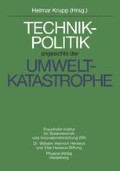Abstract
During the last decades of the 19th century up until World War I a very fundamental fear took hold of the Western industrialized nations and their peoples: it was the fear of degeneration and ultimate extinction because of the failure of the hereditary make-up of the human species to cope with modem civilization. This fear was fueled primarily by the interpretation of transient social phenomena — such as urbanization and industrialization, the proletarians’plight, a change in the family structure, and a growing awareness of all these due to a growing public health system — in the framework of one single scientific theory: Darwin’s theory of evolution.
Access this chapter
Tax calculation will be finalised at checkout
Purchases are for personal use only
Preview
Unable to display preview. Download preview PDF.
Footnotes
N. Luhmann, Die Moral des Risikos und das Risiko der Moral, unpubl. paper, 7, 112.
William C. Clark, Managing Planet Earth, Scientific American, Vol. 261, No.3, Sept. 1989, 22, 23.
Clark, op.cit., 19,25. This is the synthesizing position of the IGBP situated between a preventist and an optimistic view. Cf.S. Rayner, Risk Communication in the Search for a Global Climate Management Strategy, in: H. Jungermann et.al. eds., Risk Communication, Proceedings of an International Workshop on Risks Communication, October 17–21, 1988, Jülich, 169–176, 169.
Cf. Niklas Luhmann, Ökologische Kommunikation, Opladen 1988,23–24, 36–38.
For a discussion of the long known problem pertinent to this topic cf. G. Hardin, The Tragedy of the Commons, Science, 162, 1968, 1243–1248.
Cf. Luhmann, Ökologische Kommunikation, 247, 252–3.
William D. Ruckeishaus, Toward a Sustainable World, Scientific American, Vol.261, No,.3, September 1989, 114–120B, 115.
This is precisely the attitude that Luhmann takes himself, cf. Luhmann, Ökologische Kommunikation, op. cit.,25. The theoretical debate that this theory has initiated is not of interest here.
Cf. Scharpf, Politische Steuerung, 19; J. Berger, Autopoiesis: Wie “systemisch” ist die Theorie sozialer Systeme? in: H. Haferkamp, M. Schmidt, eds., Sinn, Kommunikation und soziale Differenzierung. Beiträge zu Luhmanns Theorie sozialer Systeme, Frankfurt 1987, 129–151, 136–137. Cf. also R. Mayntz, F. Scharpf, Chances and Problems in tiie Political Guidance of Research Systems, in this volume.
On the process between policy-making and science in focusing research on ‘environmental dangers’ cf. G. Küppers, P. Lundgreen, P. Weingart, Umweltforschung — die gesteuerte Wissenschaft? Frankfurt, 1978.
Cf. K.H. Ladeur, Jenseits von Regulierung und Ökonomiesierung der Umwelt: Bearbeitung von Ungewißheit durch (selbst-)organisierte Lernfähigkeit — eine Skizze, Zeitschrift für Umweltpolitik und Umweltrecht, 1, 1987,1–22, 8–9; E. Hagenah, Stand der Wissenschaft, Stand des Rechts - Das Zusam-mentreffen von Recht und Wissenschaft bei der gerichtiichen Überprüfung der atomrechüichen Genehmigungen, Report Wissenschaftsforschung Nr. 30, Bielefeld 1986.
J. MacNeill, Strategies for Sustainable Economic Development, Scientific American, Vol.261, No.3, September 1989, 105–113, 106.
Stephen H. Schneider, The Changing Climate, Scientific American, Vol.261, No.3, September 1989, 38–47, 47.
Editor information
Editors and Affiliations
Rights and permissions
Copyright information
© 1990 Physica-Verlag Heidelberg
About this paper
Cite this paper
Weingart, P. (1990). Doomed to Passivity? - The Global Ecological Crisis and the Social Sciences. In: Krupp, H. (eds) Technikpolitik angesichts der Umweltkatastrophe. Physica-Verlag HD. https://doi.org/10.1007/978-3-642-93629-6_5
Download citation
DOI: https://doi.org/10.1007/978-3-642-93629-6_5
Publisher Name: Physica-Verlag HD
Print ISBN: 978-3-7908-0493-5
Online ISBN: 978-3-642-93629-6
eBook Packages: Springer Book Archive

